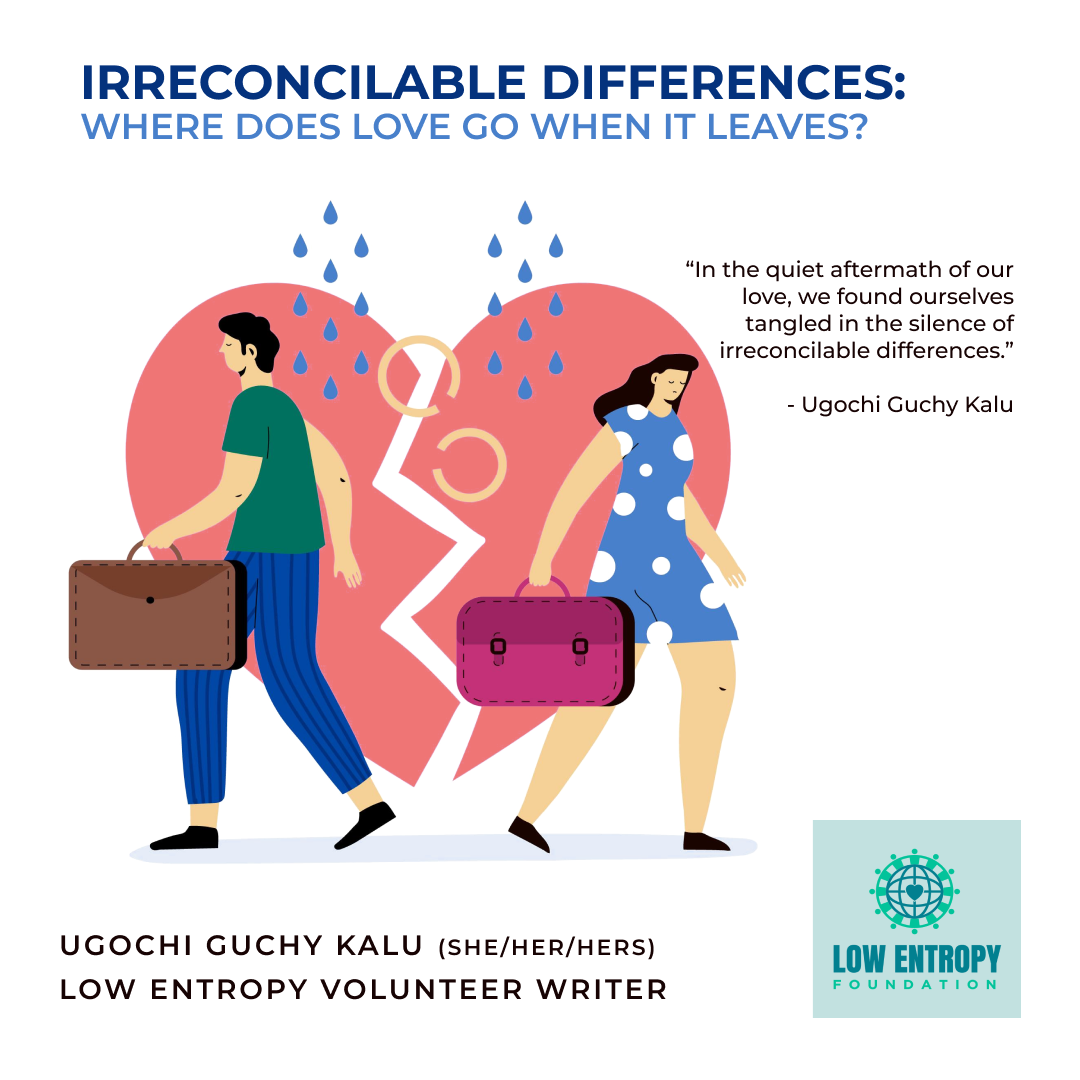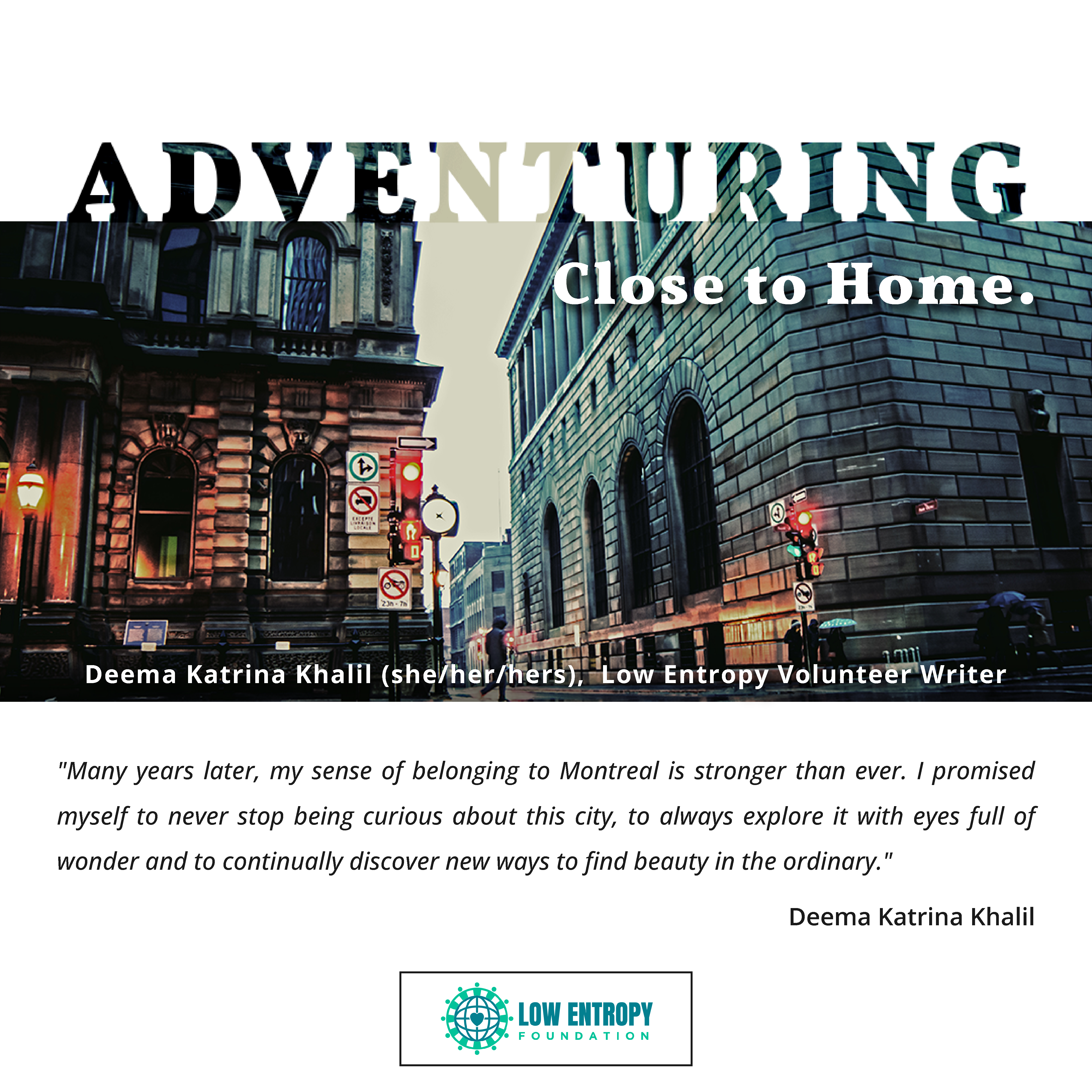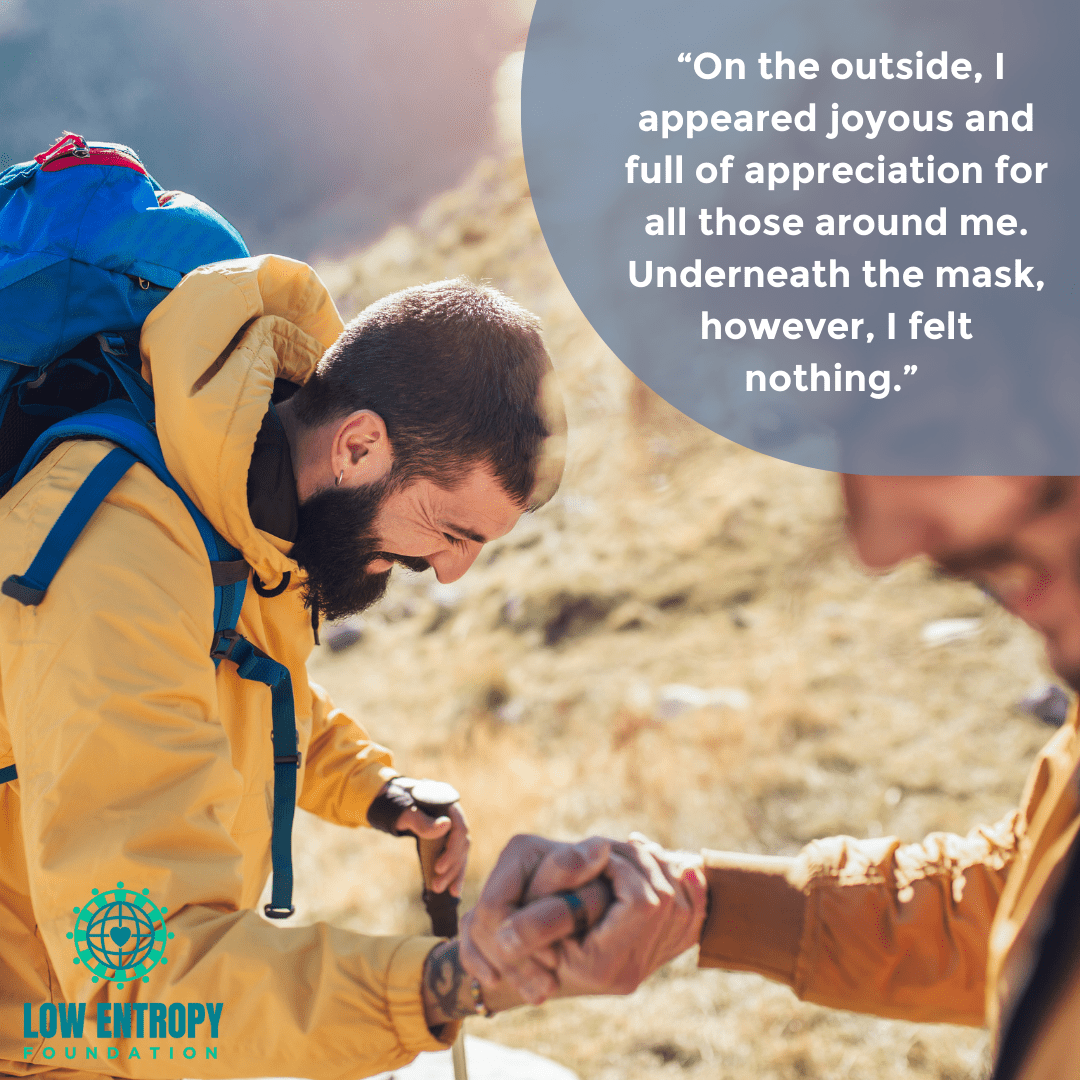Irreconcilable Differences: Where Does Love Go When It Leaves?
March 23, 2024

Ugochi Guchy Kalu (she/her/hers), Low Entropy Volunteer Writer
I used to passionately believe that love was enough. How can it not really be enough? The hot sizzling feelings, the sleepless nights we spent talking about anything and everything. The excitement that felt like a heart attack, the endless laughter, the kisses, the professions, the “I love you”s we recited more than 10 times daily. The unexplainable happiness, the promises, the light in our eyes, the tears from missing each other, the anxiety of waiting for each other—tell me, how can these not be enough? How can two people with such extraordinary feelings one day part ways? Perhaps I was a cynic or a hopeless romantic, but I did always believe that when it got tough, love would swoop in like Captain America and save the relationship.
Ethan and I had all these feelings and more. We were sure only death could come between us. We were soul mates, we finished each other’s sentences, we cried the same tears, fought over who loved the other more, we competed on how to out-gift each other. Everyone who knew us always thought we were a power couple, people admired how much we complimented each other, how we looked out for each other. I, for one, knew for sure that Ethan was my forever. Two years later, it all became hazy. Now my question remains: Where does love go when it leaves?
Imagine waking up one morning and feeling free from the one person you wanted to be bound with for life. These things creep up on you, from little resentments, keeping scores, little indiscretions, unresolved anger, the untendered apologies, the trivial lies, the emotional cheating, the innocent flirts, the mindless comments, the hurtful remarks. Sooner than later, love gets comfortable, way too comfortable, and it becomes a burden. The deterioration stages begin with ignoring tiny details and unhealthy competitions. Worse still, the feeling that we deserve better, the comparison, the constant nagging feeling that our love is no longer enough, the suffocations that soon turn into complacency. When all the negative feelings accumulate, slowly love fades into the dark, as fast as resentment and disdain take over. What is left? At this point, Ethan and I struggled with letting go. We knew for sure that letting go would bring us both peace, yet we fought so hard, deepening the hurt further.
In the quiet aftermath of our love, we found ourselves tangled in the silence of irreconcilable differences. There was no mending it, there was no cure. We were too far down the rabbit hole to make it back up. The awkward silences, the change in subjects, the inability to look each other in the eye—our love was so far gone that we held on to its shadows. What is more destructive than war is the peace and quiet before the actual war—this was true of our relationship. We no longer warred over restoration; the quietude ate deep into the fabric of our being. We made the choice to go our separate ways.
In the journey of life, relationships often serve as the cornerstones of our experiences. They shape our identities, offer companionship and contribute to our emotional well-being. However, despite our best intentions and efforts, there are moments when relationships reach an impasse. Sometimes, despite love and commitment, the realization dawns that parting ways is the only viable option. These moments, marked by irreconcilable differences, can be profoundly challenging, but also transformative.
Similarly, friendships can also be strained by irreconcilable differences. As individuals grow and evolve, their interests, priorities and worldviews may diverge, leading to a natural drift apart. This is not always a reflection of personal animosity, but rather an acknowledgment of changing circumstances and paths.
Navigating the end of relationships is a daunting task. However, amidst the pain and upheaval, there are valuable lessons to be gleaned and opportunities for personal growth.
Firstly, accepting the reality of irreconcilable differences is crucial in initiating the healing process. Denial or clinging onto false hope only prolongs the agony and impedes emotional closure. Acknowledging that, despite love and effort, some chasms cannot be bridged, is the first step towards healing.
Communication, even in the face of separation, remains vital. Honest and respectful dialogue can facilitate closure, allowing both parties to express their perspectives, emotions and intentions. While it may not alter the outcome, it fosters understanding and lays the groundwork for an amicable parting.
Self-reflection is also invaluable in navigating the aftermath of irreconcilable differences. Taking stock of one’s own needs, values and boundaries can illuminate the factors that contributed to the dissolution of the relationship. This introspection informs future interactions and choices, guiding us towards more compatible connections.
Furthermore, seeking support from friends, family or professional counselors can provide solace and perspective during challenging times. Sharing experiences and emotions with trusted confidants fosters a sense of belonging and reminds us that we are not alone in our struggles.
In the wake of our shattered love, I found myself adrift. While the acknowledgment of irreconcilable differences heralded the end of my relationship, it also paved the way for personal growth. I have come to see it not as a loss, but rather as a necessary door that had to close for new beginnings.
—
My name is Ugochi Guchy Kalu, I embraced the harsh reality of separation with grace, honesty, and self-awareness. The lessons from the failure have taught me new ways to navigate the complexities of human connections with resilience and dignity.
GET INVOLVED
At Low Entropy, we believe changing the world starts with changing ourselves.
Founded in 2015, Low Entropy Facilitates conversations that encourage diversity and promote inclusivity.
We understand that life can be confusing at times. It can seem challenging and sometimes you may feel like no one really “gets you.” We offer an opportunity to connect with others who have the capacity to understand you.









